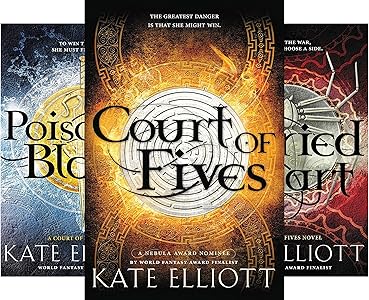Night Flower, currently only available online, is a prequel novella to Court of Fives, the first book in Kate Elliott’s YA fantasy trilogy (also titled COURT OF FIVES). The relationship between Doma Kiya and Captain Esladas — the parents of Jessamy, teenaged Fives adversary and central figure of the trilogy — is a matter of speculation for many, especially the Saroese nobles who view this pairing with disgust and disdain. In this novella, Elliott takes readers back to when Kiya and Esladas first set foot in the city of Saryenia, when they were young and seeking their fortunes, and reveals the circumstances which drew them together.
Newly arrived in Saryenia with a small group of comrades from Old Saro, Esladas immediately sets about determining how best to make a name for himself, though his unfamiliarity with local customs and the Efean language mark him as an outsider who will have to work tirelessly to transcend his humble birth. In a parallel storyline, Kiya has just begun a year-long stay in Saryenia under the watchful eye of her uncle, with the understanding that she will learn more about how to properly run a household before returning to her mother’s village. By chance, these two meet in a marketplace, and despite the language barrier and the apparent impossibility for a Saroese man and an Efean woman to have anything resembling an equal partnership, they charge forward with the infinite wisdom and impeccable judgement which infatuated strangers are known for.
 It’s interesting to see the Saryenian markets and people from two newcomer’s perspectives, and Elliott includes many small details which illuminate aspects, both large and small, of Court of Fives and Poisoned Blade. Readers who are curious as to why Captain Esladas uses the firebird as his symbol, or why Kiya names one of her twins Wenru, will find those answers here. Moreover, a few consequential characters from the novels make brief appearances here, which is fun. However, readers who haven’t read the novels yet will still find plenty to interest them in Night Flower, and are sure to find their interest piqued by Elliott’s descriptions of the city and the political unrest plaguing its people.
It’s interesting to see the Saryenian markets and people from two newcomer’s perspectives, and Elliott includes many small details which illuminate aspects, both large and small, of Court of Fives and Poisoned Blade. Readers who are curious as to why Captain Esladas uses the firebird as his symbol, or why Kiya names one of her twins Wenru, will find those answers here. Moreover, a few consequential characters from the novels make brief appearances here, which is fun. However, readers who haven’t read the novels yet will still find plenty to interest them in Night Flower, and are sure to find their interest piqued by Elliott’s descriptions of the city and the political unrest plaguing its people.
Night Flower ends with an appropriately grand romantic gesture, albeit one with a bittersweet undercurrent, when considering the domestic conflict at the heart of Court of Fives. As a novella companion to the trilogy, it’s a much-needed glimpse into the lives of the people affected by strict social rules, and a view into why a political revolution is so badly needed in Efea. Highly recommended.




This looks great Jana! I’m definitely going to have a read
I think you’ll enjoy it — I think you’d like the full-length novels, too, if you haven’t read them yet — but this would be an excellent place for you to start.